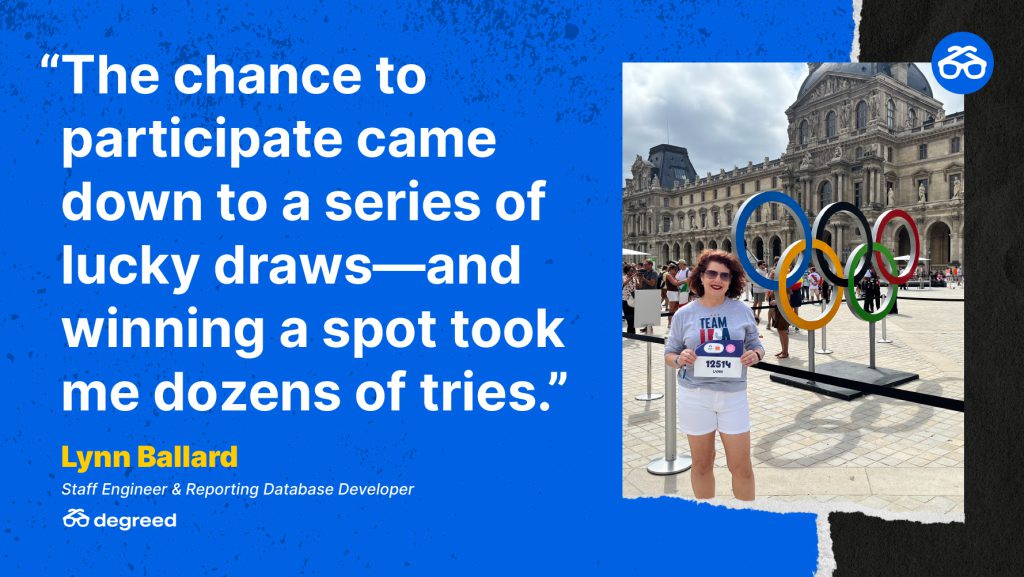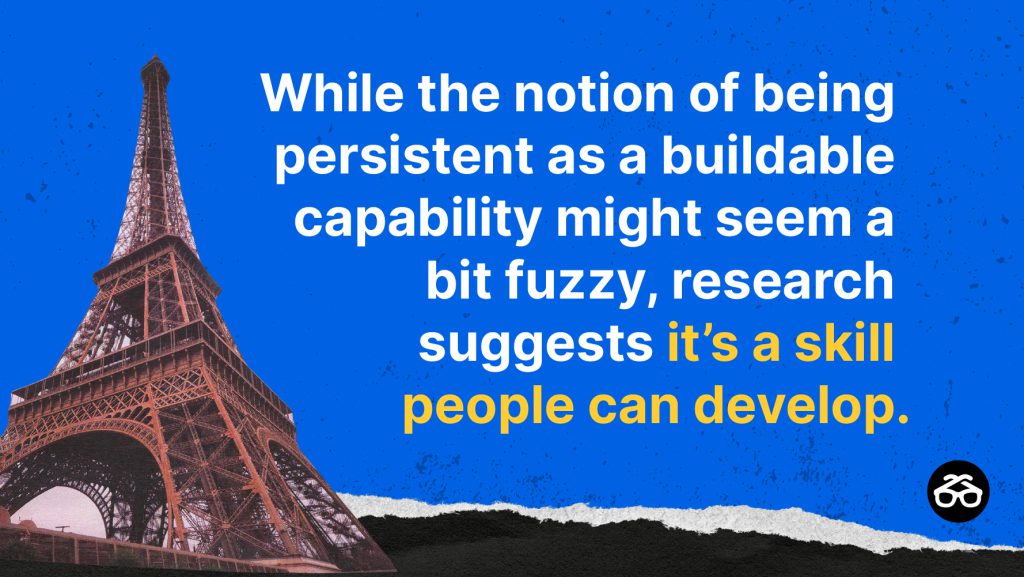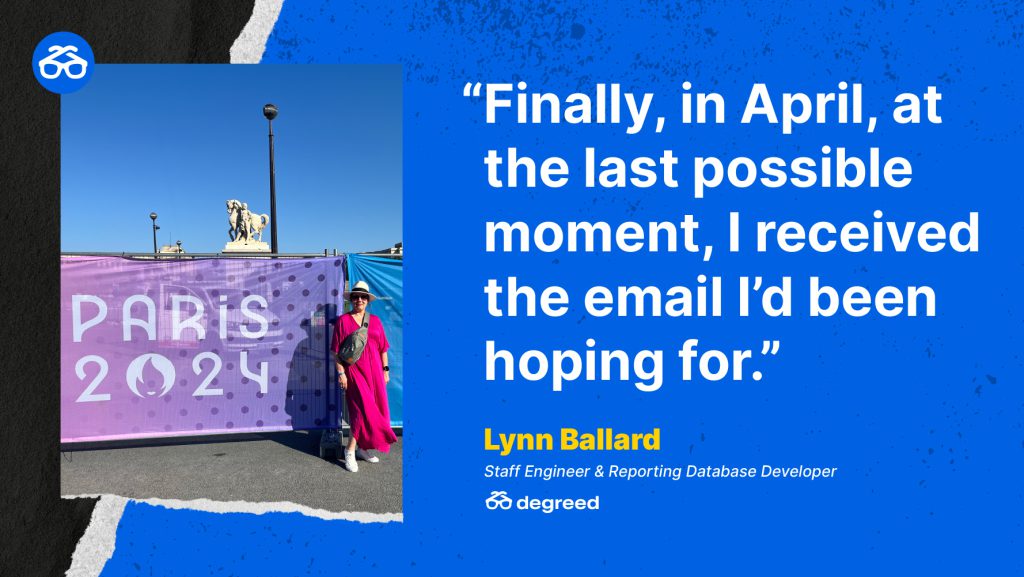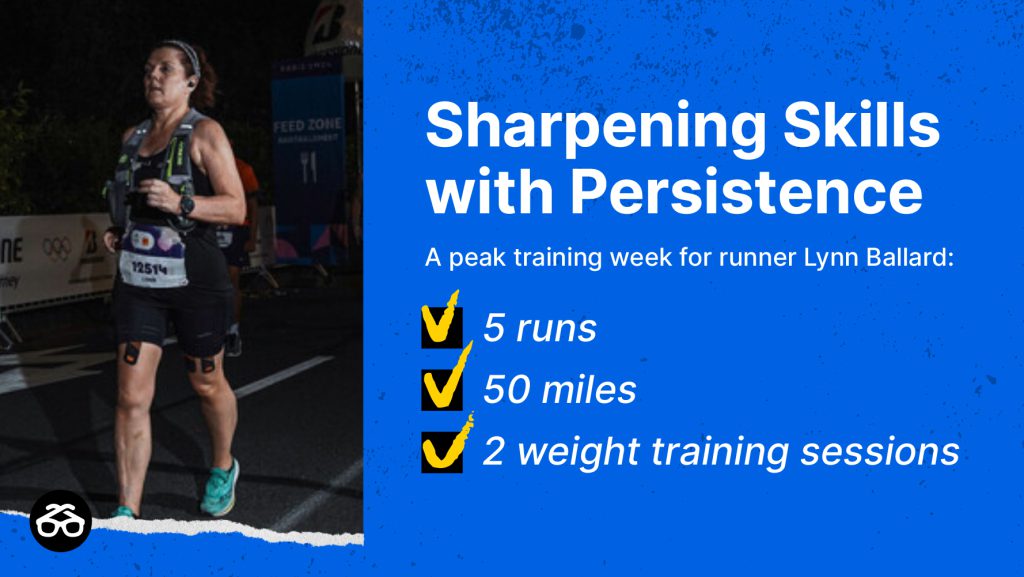Lynn Ballard is a Degreed Staff Engineer and Reporting Database Developer.
Watching the Olympics every four years was a big event in my family. But it wasn’t until 2023 that I even considered I’d have a chance to participate in anything remotely related to an Olympic event. That’s when I learned organizers of the 2024 games in Paris had created opportunities not only for elite athletes, but also for the rest of us—including amateur long distance runners like me.
The Marathon Pour Tous, or Marathon for All, sounded incredible. Amateur athletes could run the same course as the elites on an original and historic 26.2-mile loop linking Paris and Versailles—winding from the Hôtel de Ville through nine city districts to the Esplanade des Invalides—a path traveled by Parisian mothers during the French Revolution who marched for food amid famine.
But there was one big catch. I literally had to win a lottery to get into the race. The chance to participate came down to a series of lucky draws—and winning a spot took me dozens of tries over several months.

After I crossed the finish line early Sunday morning with more than 20,000 other runners from around the world, clocking in with a respectable time of 5 hours and 32 minutes, I reflected on this journey and kept coming back to one simple yet powerful concept—being persistent and showing up.
Is being persistent a skill?
“Keep showing up” were the words two-time Olympian Des Linden said after winning the 2018 Boston marathon, when she was asked how she stayed motivated after years of narrowly missing a chance to ascend to the top of the podium. “Every day I make the choice to show up and see what I’ve got and to try and be better. Keep showing up.”
Winston Churchill said that “Success is stumbling from failure to failure with no loss of enthusiasm.”
Hellen Keller said that “A bend in the road is not the end of the road, unless you fail to make the turn.”
While the notion of being persistent as a buildable capability might seem a bit fuzzy, research suggests it’s a skill people can develop—in their work and in their personal lives—by shifting their attitudes and dialing in their points of view.

Writing in Inc., author and motivation expert Jeff Haden cites a wealth of research explaining that persistence derives from decision-making. Data came from who else but long distance runners, specifically 200 participants in 155-mile multistage desert ultra-marathons.
Evidence emerged showing a causal relationship between the participants’ coping strategies and whether they finished their races. As Haden notes, some of the runners “used what the researchers called ‘adaptive coping strategies.’ Instead of seeing suffering as happening to them, they decided to see their extreme discomfort as a challenge: As something they chose. (Which, of course, they had.) Or finding ways to ignore or distract themselves from the pain.”
On the flip side, Haden notes, “some participants fell prey to ‘maladaptive coping strategies.’ Like feeling scared by the discomfort and pain they experienced. Or seeing a certain level of pain as a clear signal to stop. (Which, to be fair, seems a reasonable response.)
“The bottom line? A single occurrence of a maladaptive coping strategy tripled the chances a participant would drop out of a race.”
Persistence: My Ticket to France
I couldn’t just sign up for the Marathon Pour Tous and get a race bib. Nobody could. Would-be participants had to complete running challenges tracked by an official app that entered them into the selection lotteries.
I downloaded the app, synced it to my Garmin watch, and began participating in as many challenges as I could. Over the span of 20 months, I completed a whopping 55 challenges.
All that effort got me into 55 lotteries—and I didn’t win any of them. But I never gave up. What I didn’t know was each completed challenge gave me another entry into one final draw.
Finally, in April, at the last possible moment, I received the email I’d been hoping for—and it was time to start training for THE marathon.

The Rigors of Getting Ready
My training regimen included five days of running each week, with a mix of long runs, hill tempos, track sprints, and easy runs based on heart rate. As marathon prep demands, my training at times got rigorous, pushing my weekly cumulative distance to 50 miles during peak weeks. I paid close attention to my overall health, weight training twice a week and monitoring my body composition.
One of the more challenging aspects was adjusting to the time zone and preparing for a night race. My group’s start time was 10:10 p.m., meaning I would be running until around 3 a.m. This required careful planning around sleep, nutrition, and hydration, especially considering the physical toll of long-distance travel and jet lag.

Crossing the Finish Line
I was blown away by the crowds and spectators! In some places, they were eight to ten people thick, and their cheers felt deafening. There were definitely places along the route where I struggled, but hearing people shout “Allez, Lynn!” (French for “Go, Lynn!”) helped me stay excited, and I forget how much it hurt to run a hilly, 26-mile race.
Finishing the race, my fifth marathon since I began running 14 years ago, reaffirmed my strong belief that the key to training for and running a long distance event—like so many things in life—is being persistent.
With dedication and the support of my loved ones, I worked to meet a goal that sometimes seemed out of reach.
The road to this marathon was not straightforward. It was filled with setbacks and moments of doubt. Some days, I didn’t feel like running, but I reminded myself of my objective.
Being persistent is a skill that has not only made me a better runner but also a more resilient person.
Persistence can turn your dreams into reality.
